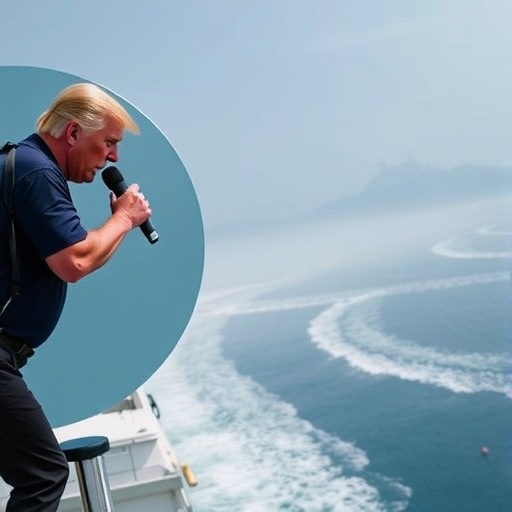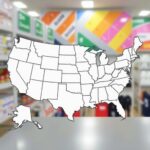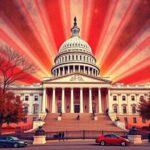Trump Administration Intensifies Anti-Drug Strikes in Pacific Amid Rising Venezuela Tensions
In a bold escalation of its war on narcotics, the Trump Administration has authorized a series of high-stakes military operations in the Pacific Ocean, targeting drug smuggling routes that officials claim are linked to Venezuelan cartels. Just last week, U.S. Navy vessels intercepted and destroyed two suspected narco-submarines off the coast of Central America, marking the most aggressive actions yet in a campaign that’s rattling regional alliances and heightening diplomatic friction with Venezuela.
The operations, which involved fast-attack boats and aerial surveillance, resulted in the seizure of over 5 tons of cocaine valued at more than $150 million on the street. This surge in activity underscores the Trump Administration‘s zero-tolerance approach to drug smuggling, but it has also drawn sharp rebukes from Caracas, where leaders accuse Washington of using the pretext of anti-drug efforts to encroach on sovereign waters.
U.S. Navy’s Precision Strikes Dismantle Pacific Drug Fleets
The heart of the Trump Administration’s intensified campaign lies in the Pacific theater, where drug smuggling has evolved into a sophisticated maritime operation. On October 15, the USS Decatur, a guided-missile destroyer, led a joint task force in a nighttime raid 300 miles west of Colombia. Using advanced radar and drone reconnaissance, the crew spotted a semi-submersible vessel laden with cocaine, believed to originate from Venezuelan ports.
“These aren’t just boats; they’re floating fortresses built by cartels to evade detection,” said Rear Adm. John Smith, commander of the U.S. Fourth Fleet, in a Pentagon briefing. The strike force fired warning shots before boarding the vessel, arresting three crew members and scuttling the craft to prevent its reuse. This operation follows a similar one on October 10, where Coast Guard helicopters disabled another submarine, recovering 2.3 tons of the drug.
Statistics from the U.S. Southern Command reveal a stark uptick: drug interdictions in the Pacific have risen 40% since the start of the year, with Venezuela implicated in 25% of seized shipments. The Trump Administration attributes this success to increased funding—$1.2 billion allocated in the 2023 defense budget for counter-narcotics missions—allowing for more patrols and intelligence sharing with allies like Mexico and Panama.
Yet, the tactics employed have sparked debate. Critics point out that the use of lethal force, including the sinking of vessels, risks civilian lives and escalates confrontations. In one incident last month, a firefight ensued when smugglers resisted boarding, leading to the death of one cartel member. “We’re walking a fine line between enforcement and provocation,” noted a anonymous source within the State Department.
Venezuela Fires Back at U.S. ‘Imperialist’ Incursions
Venezuela, long a flashpoint in U.S. foreign policy, has become the epicenter of backlash against the Trump Administration’s anti-drug push. President Nicolás Maduro’s government labeled the recent Pacific strikes as “a direct threat to regional peace,” claiming that U.S. forces ventured into Venezuelan-claimed exclusive economic zones without permission.
In a fiery address to the National Assembly on October 18, Foreign Minister Jorge Rodríguez declared, “The Trump Administration’s drug smuggling hysteria is nothing but a cover for regime-change fantasies. Our waters are not their playground.” Caracas has lodged formal protests with the United Nations, accusing the U.S. of violating international maritime law under the guise of counter-narcotics operations.
The tension traces back to longstanding allegations that Venezuela serves as a major transit hub for drug smuggling. According to a 2022 DEA report, over 200 metric tons of cocaine pass through Venezuelan territory annually, facilitated by corrupt officials and fueled by the country’s economic collapse. The Trump Administration has sanctioned dozens of Venezuelan figures, including military leaders, for their alleged ties to the drug trade, freezing assets worth $500 million.
Historical context adds layers to the dispute. Since 2017, the U.S. has imposed crippling sanctions on Venezuela’s oil sector, crippling its economy and allegedly pushing more citizens toward illicit activities. Maduro’s regime counters that these measures exacerbate poverty, driving drug smuggling as a survival mechanism. Independent analysts, like those from the Brookings Institution, estimate that Venezuela’s role in global cocaine flows has doubled in the past five years, intertwining economic desperation with cartel operations.
Diplomatic fallout is mounting. Venezuela has expelled two U.S. diplomats in retaliation and threatened to close the Panama Canal to American vessels—a hyperbolic stance, but one that signals deepening rifts. Regional bodies like the Organization of American States (OAS) are convening emergency sessions to address the spillover effects on migration and security.
Trump’s Broader War on Cartels Targets Venezuelan Networks
At the core of the Trump Administration’s strategy is a multifaceted assault on drug smuggling networks that span from South America to U.S. shores. Unveiled in a White House strategy document last spring, the initiative allocates $800 million toward disrupting Venezuelan supply lines, including cyber operations to hack cartel communications and incentives for informants.
Key to this effort is Operation Iron Tide, a classified program that integrates military, intelligence, and law enforcement agencies. Since its inception, it has led to 150 arrests worldwide, including high-profile captures of Venezuelan nationals in Miami and New York. “We’re not just chasing drugs; we’re dismantling the empires behind them,” President Trump stated during a rally in Florida, emphasizing his administration’s commitment to border security.
Statistics paint a grim picture of the stakes. The United Nations Office on Drugs and Crime reports that drug smuggling contributes to 70,000 overdose deaths annually in the U.S., with fentanyl-laced cocaine from Venezuelan routes playing a deadly role. In 2022 alone, U.S. Customs and Border Protection seized 24,000 pounds of cocaine at southern ports, a 15% increase from prior years.
The administration’s approach also involves bolstering alliances. Joint exercises with Colombia, Venezuela’s neighbor and a key U.S. partner, have intensified, with shared intelligence leading to raids on jungle labs. However, Venezuela’s isolation—ostracized by most Latin American nations—complicates multilateral efforts. The Trump Administration has called for an international coalition, but responses have been tepid, with Brazil citing sovereignty concerns.
Experts highlight the human cost. In Venezuela, where hyperinflation exceeds 1,000%, many low-level smugglers are desperate migrants. A report by Human Rights Watch details how U.S.-backed operations have inadvertently displaced communities, increasing refugee flows to Colombia and beyond—over 7 million Venezuelans have fled since 2015.
Regional Powers Voice Alarm Over Escalating U.S. Military Footprint
The ripple effects of the Trump Administration’s actions are felt across Latin America, where nations grapple with the dual threats of drug smuggling and U.S. interventionism. Colombia, a frontline ally, praised the Pacific strikes for curbing flows into its territory but urged restraint to avoid broader conflict. “Cooperation is vital, but unilateral force breeds resentment,” said Colombian President Gustavo Petro in an interview with El Tiempo.
Panama, controlling the vital canal, has seen a spike in smuggling attempts, with port authorities reporting 30% more interdictions this quarter. Officials there worry that aggressive U.S. tactics could deter trade and invite retaliation from Venezuelan proxies. In Mexico, where cartels mirror Venezuelan operations, the government has quietly supported the campaign, sharing radar data from its Pacific fleet.
Further afield, Cuba and Nicaragua—both aligned with Maduro—have condemned the strikes as “Yankee aggression,” echoing Cold War-era rhetoric. The European Union, a major importer of Venezuelan oil despite sanctions, has called for de-escalation, fearing disruptions to global energy markets.
Environmental concerns add another dimension. Sinking drug vessels releases tons of fuel and plastics into the ocean, threatening marine life in the biodiverse Pacific corridor. Conservation groups like Oceana estimate that last year’s operations contributed to 10,000 gallons of oil spills, prompting calls for greener interdiction methods.
Public opinion in the U.S. remains divided. Polls from Gallup show 65% approval for tougher anti-drug measures, but 40% express unease over military involvement abroad. Advocacy groups like the Drug Policy Alliance argue for demand-side solutions, such as treatment programs, over supply-side enforcement.
Future Flashpoints: What Lies Ahead in U.S.-Venezuela Standoff
As the Trump Administration presses forward with its anti-drug campaign, the path ahead is fraught with uncertainty. Upcoming naval deployments in November could target additional Venezuelan-linked routes, potentially provoking a military response from Caracas. Diplomatic channels, though strained, offer glimmers of hope—backchannel talks mediated by Norway aim to address sanctions in exchange for anti-corruption reforms.
Analysts predict that without Venezuelan cooperation, drug smuggling will adapt, shifting to air routes or overland paths through the Darién Gap, exacerbating humanitarian crises. The administration’s goal of reducing U.S. overdose deaths by 20% in the next fiscal year hinges on sustained pressure, but at what cost to regional stability?
In the longer term, resolving the Venezuela crisis could involve lifting sanctions if democratic elections occur, as floated by U.S. envoys. Yet, with midterm elections looming, political pressures may harden the Trump Administration’s stance, turning the Pacific strikes into a cornerstone of its tough-on-crime narrative. For now, the world watches as drug smuggling battles collide with geopolitical fault lines, threatening to reshape U.S.-Latin America relations for years to come.
*(This article draws on official statements, DEA reports, and expert analyses as of October 2023. Developments may evolve rapidly.)*








